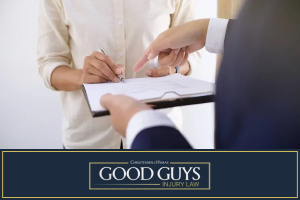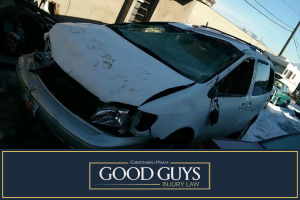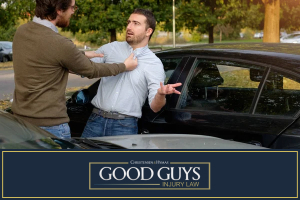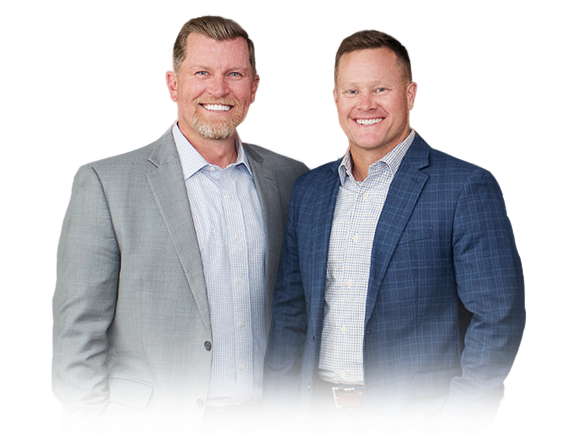
Navigating the aftermath of a car accident in Utah can be overwhelming and confusing. Many have questions about what steps to take, how the law affects their rights, and what they can expect during the claims process. Good Guys Injury Law is here to provide clarity and guidance. We aim to help you understand your rights and the legal process following a car accident in Utah.
Our Utah personal injury attorney is here to answer your questions and advocate for your rights. We can even work with the other driver’s insurance company to file your car accident insurance claim and cover your medical bills. The insurance defense attorneys at our Utah law firm always put your needs first. Learn more below, and contact us to schedule a free consultation.
Table of Contents
What are the first steps I should take immediately after a car accident in Utah?
The moments after a car accident in Utah are crucial. First, check for any injuries and call 911 if anyone needs medical attention. Then, move to a safe area and exchange information with the other driver. Do not forget to document the scene by taking photos and noting down the details of the accident.
Avoid discussing fault at the scene and focus on gathering information. Contact the police to report the accident; a police report is essential for your insurance claim. Finally, notify your insurance company about the accident, but only make admissions or sign any documents once you speak with an attorney. We are here to fight for your rights after a car accident.
How do Utah’s laws affect my ability to claim compensation after a car accident?
Utah’s laws can significantly impact your car accident claim. Being a no-fault state, Utah requires drivers to file a claim with their own insurance company for medical expenses, regardless of who caused the crash. However, you can step beyond the no-fault system and file a claim against the at-fault driver if your injuries are severe or if the damages exceed a certain threshold.
Utah’s comparative negligence law is also crucial. It means that if you’re partly at fault for the crash, your compensation could be reduced by your percentage of fault. Understanding these laws is critical to navigating your claim effectively, and an attorney can help explain how these laws apply to your specific case.
How does Utah’s no-fault insurance system impact my car accident claim?

Utah’s no-fault insurance system affects how car accident claims are handled. Under this system, your own insurance company pays for medical expenses and lost income up to the limit of your personal injury protection (PIP) coverage, regardless of who caused the accident. This system aims to speed up the compensation process for injury-related expenses.
However, you may want to file a claim against the at-fault driver’s insurance for damages beyond PIP coverage. This is where understanding the details of your policy and the accident’s impact is crucial. An attorney can guide you through this process and help determine the best action for your situation. Give us a call for help with this issue.
What should I do if the other driver involved in the accident is uninsured or underinsured?

Having an uninsured or underinsured driver in Utah can complicate your claim. First, check your own insurance policy for uninsured/underinsured motorist coverage. Notify your insurance company about the accident and the other driver’s insurance status.
You may need to explore other legal options if you don’t have such coverage or your damages exceed its limits. Navigating these situations can be complex, and legal advice is invaluable. Reach out to us for help with a distracted driving car accident.
How do I obtain a copy of the accident report for my car accident in Utah?
Obtaining a copy of the accident report is an essential step in your car accident claim in Utah. You can request the report from the law enforcement agency that responded to the accident. This might be the local police department, sheriff’s office, or the Utah Highway Patrol, depending on where the accident occurred.
Visit the agency’s website or office to request the report, and be prepared to provide details like the accident date and your personal information. There may be a small fee for the report. This document is crucial for any legal action, as it contains essential details about the accident.
What kind of compensation can I expect from a car accident claim in Utah?

The compensation for a motor vehicle accident claim in Utah depends on several factors. These include the severity of your injuries, the type of car damage, and the accident details. Generally, you may be entitled to recover costs for medical expenses, lost wages, property damage, and pain and suffering.
The compensation recovered can vary significantly from case to case. Factors like the degree of fault, insurance policy limits, and the long-term impact of your injuries play a significant role.
Should I speak to the insurance company before consulting a lawyer after a car accident?
It’s essential to be cautious when dealing with insurance companies after a car accident. While you should notify your insurance company about the accident, it’s advisable to consult with a lawyer before giving any detailed statements or accepting any settlements. Insurance companies will avoid paying anything, if possible.
A lawyer can guide what information to share and can negotiate with the insurance company on your behalf. They can help ensure that any settlement offer is fair.
How is fault determined in a car accident case in Utah?

Determining fault in a car accident in Utah involves examining evidence from the accident. Utah’s comparative negligence law also plays a role, allowing for fault to be shared among multiple parties. The degree of fault attributed to each party can affect the outcome of the claim.
Insurance company assessments may not always align with your perspective. An attorney can help gather and present evidence to support your account of the accident and challenge any unfair fault determinations.
What are the common mistakes to avoid when filing a car accident claim in Utah?
When filing a car accident claim in Utah, several common mistakes must be avoided. First, don’t wait too long to take action. Delaying can hurt your claim, especially as evidence can be lost and memories can fade. Second, avoid admitting fault or making statements that could be used against you. Stick to the facts and let the investigation unfold.
Third, don’t accept the first settlement offer from the insurance company without consulting a lawyer. These initial offers are often lower than what you might actually deserve. Lastly, ensure all your medical treatments and damages are well-documented. Incomplete documentation can weaken your claim and reduce your compensation.
How long does a typical car accident settlement process take in Utah?
The length of the car accident settlement process in Utah varies depending on the complexity of the case. Simple cases with apparent fault and minor injuries might settle within a few months. However, more complex cases, especially those involving severe injuries or disputes over fault, can take a year or more.
The process involves investigation, negotiation, and sometimes litigation. Patience is vital, as rushing to settle can lead to accepting less compensation than you deserve. We will keep you informed every step of the way.
Can a lawyer help if my car accident claim is denied by the insurance company?
Yes, a lawyer can be incredibly beneficial in this situation. They can review the denial, assess the reasons provided, and determine the best course of action. Sometimes, a denial is based on a misunderstanding or insufficient information, which a lawyer can help address.
Their expertise ensures that you have a strong advocate who understands the intricacies of Utah’s car accident and insurance laws. Don’t accept a denial as the final word; legal expertise can turn the situation around and secure the compensation you deserve.
What are the potential consequences if I fail to report a car accident in Utah?
Failing to report a car accident in Utah, especially involving injuries, deaths, or significant property damage, can lead to serious legal repercussions. You could face fines, license suspension, or even criminal charges, depending on the circumstances.
Furthermore, not reporting an accident can complicate your insurance claim. With a report, proving the details of the accident becomes more accessible, and you may be able to receive fair compensation. Reach out to us for help with your personal injury claim.
Contact Good Guys Injury Law for Questions About Car Accidents in Utah

If you’re dealing with the aftermath of a car accident in Utah, take your time navigating the complex legal and insurance landscape. Contact Good Guys Injury Law for expert guidance and representation. We can even work with your insurance carrier to ensure your insurance coverage is appropriately honored.
We understand that each car accident case is unique and are committed to providing personalized attention to your situation. Our goal is to make the legal process as stress-free as possible for you. Reach out to us today to discuss your case, and let us be your advocates in this challenging time.





